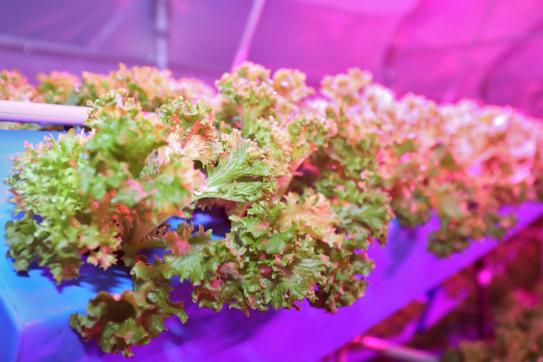Some of the biggest innovations come from upending foundational concepts that seem incontrovertible. Take, for instance, this basic truism that even kindergartners know: Plants need soil and sun to grow.
Not so, says David Rosenberg ’02, co-founder and CEO of AeroFarms. What plants need is a spectrum of light and nutrients. AeroFarms grows its produce indoors, sans soil or sun, using cost-efficient LED lighting and nutrient-fortified water — a technique called vertical farming. Each plant benefits from a customized and controlled environment, maximizing yield and quality and reducing time to harvest. The results are so impressive that The Produce News named Rosenberg one of the industry’s top 35 innovators in history.
In a recent Startup Alley podcast from the Lang Entrepreneurship Center, Rosenberg shared the story behind the groundbreaking company that’s producing food without breaking any ground. Here are a few of his insights for would-be entrepreneurs.
A Problem Creates a Business Opportunity
For Rosenberg, that problem was water. “Most water goes to agriculture. Most water contamination comes from agriculture,” he says. “So if you want to solve water, you need to solve agriculture.”
Rosenberg argues that business can take the lead in solving problems like these. With vertical farming’s closed-loop system, AeroFarms uses only 5 percent of the water required for traditional agriculture and reduces contamination as well.
But policymakers can impact the ability of businesses to take the lead in these issues and prompt the motivation. For instance, when policymakers keep the price of water artificially low to improve global access, businesses lose the incentive to find ways to conserve the precious resource, undermining the development of business-led climate solutions. “As much as possible, you want to put the policies that drive performance and move standards in the right direction into commerce so that commerce can figure it out,” he says.
You Don’t Have to Know Everything
“I’m a kid from the Bronx,” Rosenberg says. “There’s not a lot of agriculture in the Bronx, besides the Bronx Botanical Gardens.” But Rosenberg didn’t let his lack of experience in the food and farming industries deter him. Instead, he educated himself on the technology and formed partnerships with people who could fill knowledge gaps. Ed Harwood, a graduate of Cornell University’s agriculture school and pioneer in vertical farming, stepped in as co-founder. Another CBS graduate, Marc Oshima ’96, came on board with business experience in the food industry.
And when it was ready to expand, AeroFarms formed strategic partnerships to scale in a capital-efficient way, including a recent joint venture with Saudi Arabia’s sovereign Public Investment Fund to build the region’s largest vertical farm. It all adds up to a company now operating nationwide through Whole Foods, Walmart, and other players, as well as internationally. Not bad for a city slicker.
Start with the Early Adopters
As AeroFarms looked to expand overseas, the Middle East offered an excellent opportunity with its low percentage of arable land and fresh water, high produce imports, and abundant energy resources. Not only was the environment an ideal fit for AeroFarms’s disruptive business model, but the culture openly embraced innovation.
“As an entrepreneur, I’m a believer in looking where the early adopters are and then branching out,” Rosenberg explains. “You don’t have to look further than the amazing architecture to see that that part of the world is willing to be an early adopter. They’re willing to be a leader in some respects. As an entrepreneur and an innovator, we lean into that, and we’re happy to be part of that ecosystem. There’s a lot of excitement about what we’re doing.”
Doing Good Is Good Business
Instead of creating a separate silo for social responsibility, companies should be looking for how to make doing good a part of doing well. At AeroFarms, using less energy and water to produce a healthy product makes sense both fiscally and environmentally. AeroFarms also prioritizes social responsibility in its hiring practices, with a notable record of recruiting and training previously incarcerated individuals — not just for jobs, but for long-term careers.
“We really look at our business in this multifaceted way,” Rosenberg says. “How do we do good with commerce? Personally, at one point in my career, I considered going into politics. But I think the biggest impact I can have is as an entrepreneur, building businesses that have a huge positive impact.”
Check out the full podcast to hear more of the AeroFarms story, including how Rosenberg identifies new talent. (Hint: It’s not through resumes.)
